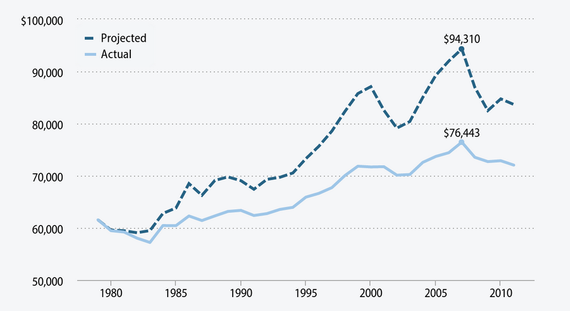17 Things We Learned About Income Inequality in 2014
http://www.theatlantic.com/business/archive/2014/12/17-things-we-learned-about-income-inequality-in-2014/383917/

?nh1hqc
1) Where Things Stand Right Now
Income inequality isn’t just about the inability of some to afford the finer things in life. Research suggests that a wide gulf between incomes can have more pernicious effects, such as increased feelings of disenfranchisement, fewer opportunities for advancement, and increased poverty. Some economists have even suggested that a large gap between class incomes can lead to stunted economic growth. Between 2009 and 2012 the top one percent of Americans enjoyed 95 percent of all income gains, according to research from U.C. Berkeley. The same study found that income inequality may be at its most pronounced levels since 1928, the height of the stock-market bubble.

2) As Long As We're Still Growing, Right?
In theory, income inequality in a capitalist society is highly probable and maybe even a little bit desirable. After all, people need financial incentives to work hard and innovate. But inequality could also impair growth if those in the middle and at the bottom have no money to spend.
3) Piketty, Piketty, Piketty
Given that Thomas Piketty’s Capital in the Twenty-First Century dipped into data that spans centuries, it seems like he could’ve picked any year in the past decade to release his findings. He chose 2014, and unexpectedly—to the press and even to his publisher—the book took off. No fewer than three Nobel Prize winners have done work similar to Piketty’s, and yet for some reason he was the one to become identified with the topic of wealth inequality. Even though Capital was so deeply researched that it’d be foolish to call its success entirely a fluke, it’s undeniable that Piketty gave 2014’s book-buying public what it wanted: a well-dressed, well-educated European alternative to an Occupy movement that is still aimless and now rundown. No wonder it sold 80,000 copies in two months.
4) But What if Piketty Is Wrong?
And like any celebrity in 2014, Piketty was not immune to intense scrutiny. Chris Giles, the economics editor of the Financial Times, raised the first significant public concerns about Piketty’s data sets in late May, the month after the book was published. Piketty refused to acknowledge any problems with his numbers, insisting that his manipulations were deliberate and that his conclusions still stood. Reasonable people disagreed from all angles. Yes, the debate spoke to the murkiness of any economic data that’s more than a few decades old, but it also revealed a larger truth behind the bickering: The year 2014 was so focused on wealth inequality that a conversation about 18th-century financial data took on the emotional charge that Americans usually reserve for much more frivolous topics.
 ?nh1hqc
?nh1hqc
